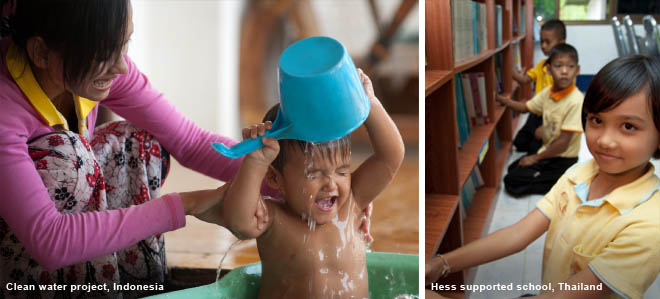Our company is committed to meeting the global demand for energy in a manner that safeguards the health and safety of our employees, preserves the environment and makes a sustainable and positive impact on the communities where we operate.
In 2009, we improved our safety performance for the fifth consecutive year, reducing our combined employee and contractor safety incident rate by nearly 25 percent. Our safety and health management systems support our commitment to continuous improvement.
We made progress on climate change by setting a greenhouse gas intensity reduction target for 2013 that is 20 percent below the 2008 baseline for our oil and gas operations. Emission reductions are being achieved through projects in Algeria and Equatorial Guinea that enhance production while reducing the amount of gas flared. We have also instituted a company-wide energy efficiency program, obtaining 10 percent of all electricity used in our operations from renewable sources.
Our management systems establish expectations for resource conservation, pollution prevention and facility design optimization to minimize the potential environmental impacts from our activities. In 2009, the volume of oil spilled from our operations was 75 percent less than 2008.
We partner with a variety of stakeholders to advance education and health in communities where we operate. In Equatorial Guinea, we are helping transform primary education on a national scale with model schools, teacher training and materials and building renovations. Our commitment to improving education is also evident in Thailand, where we are helping schools enhance library services for their students. In Libya, the company together with the National Oil Corporation and Partners Harvard Medical International conducted a study to develop a plan for a diabetes prevention, treatment and training program. In Indonesia, community programs are providing new water wells and distribution networks for clean drinking water.
The company engages in voluntary initiatives in support of human rights, environmental protection and financial transparency. Hess has endorsed four major voluntary frameworks: The Voluntary Principles, the Universal Declaration on Human Rights, the United Nations Global Compact, and the Extractive Industries Transparency Initiative. In 2009, we performed a Human Rights Risk Assessment in Southeast Asia and conducted training to conform with the voluntary multi-stakeholder initiatives we have endorsed.
We are proud of the progress we made in 2009 and we will continue to pursue our strategy to improve our performance and develop partnerships in social responsibility.


